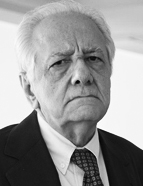

Evaldo Cabral de Mello has always sought to avoid labels and expressed a dislike for fashionable "isms". However, in the interview referenced above — one of the first he gave on his historiographical work while serving as Consul General of Brazil in Lisbon — he did not shy away from self-definition: "The historian is the innate saboteur of the sociologist, the anthropologist, the economist (...). If I had to define myself epistemologically, I would use the formula, now completely forgotten and out of fashion, coined by Georges Gurvitch in the 1950s: that of 'dialectical hyper-empiricism'" (Idem, p. 142).
Wary of interdisciplinarity in historiography, Evaldo Cabral de Mello questioned, upon assuming chair no. 34 of the Academia Brasileira de Letras (ABL) in 2015, whether "the very success of co-operation between history and the human sciences prompts us to ask whether it hasn't turned into an orgy. While interdisciplinary collaboration can enrich historical explanation and understanding, it may have side effects when pursued without a sufficiently critical approach. The difference between history and the human sciences also lies in their expressive resources, or rhetoric, to use the noble term that has been diminished by prolonged misuse. Narrativity and diachrony, as fundamental records of human experience, form the irreducible core of historiographical discourse. No matter how far the human sciences progress, there will always be an inherent need to approach the past in terms of what happened and not in terms of laws or general theories or grand theoretical concepts" ( Discurso de posse [Acceptance speech], 2015).
After Olinda restaurada , Evaldo Cabral de Mello’s most analytical work, he published O Norte agrário e o Império (1871-1889) [The agrarian North and the Empire (1871-1889)] in 1984, from that point onward, the author showed an increased concern with narrative. In his approach to writing history, and drawing on his synthesis of French and English historiographies, Cabral de Mello argued that, while history holds a scientific status, it is also a literary genre. He believed historians should strive to reach audiences beyond scholars and subject-matter experts.
This work is financed by national funds through FCT - Foundation for Science and Technology, I.P, in the scope of the projects UIDB/04311/2020 and UIDP/04311/2020.
